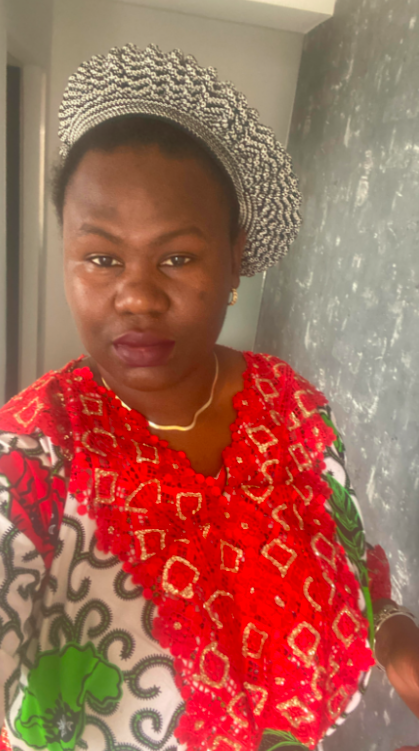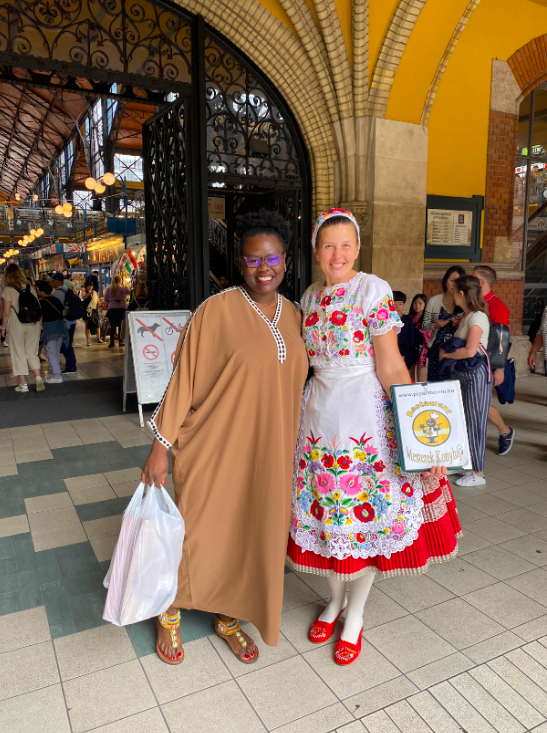Bridging cultural research with technology!
Tiako Djomatchoua Murielle Sandra is a Ph.D. student in the Department of French and Italian. Murielle recently received a CDH Graduate Training Grant to attend the 2023 DARIAH-EU Annual Event in Budapest.
The twenty-first century launched a total digital revolution that affects all areas of human life. Attempts to recover and reconstruct history gained impetus through rigorous scientific research as well the craziest creative experimentations. While the outcomes have been astonishing and mind-blowing, many aspects of “other” histories still remain a mystery. How do I approach the immense project of deciphering the history of Africa? What will be my point of entry? These were perplexing questions that were exciting as well as challenging. Jumping into the world of archives seemed to be a solution! Like a surgeon who needs gloves, scalpels, and scissors, I needed a pen, a paper, magnifying glasses, and a computer.
Where to find the archive was a question I approached naively. The “innocence” of my approach sustained the belief that African archives should be in Africa. Venturing in Africa as a GradFUTURES “explorer,” my journey started in Dakar, Senegal, where I worked for Madam Fatou Kine Sene, the President of the Federation of African Film Critics (Federation Africaine des Critiques du Cinéma - FACC). Sponsored by the Princeton University GradFUTURES Program, the experience in Dakar, Senegal, and the sustained support of my mentor, Fatou Kine Sene, enabled me to discover the artistic wealth of the francophone world and the extensive negligence of archives in the arts and culture field during the Dak’Art festival of contemporary arts in Dakar, Senegal. Then, interning at the Panafrican Film and Television Festival of Ouagadougou (FESPACO) in Ouagadougou, Burkina Faso, and running interviews with key figures of the cultural environments—namely, Mr. Alex Moussa Sawadogo, Mr. Ardiouma Soma, Mr. Leonce Tira, Mr. Aboubacar Ouango, Mr. Diallo, Mr. Kalaga Sidi Mohamed, Mr. Sanfo Abdoulaye, Mr. Traore, and Mr. Zoundi—made me discover the emergencies in inventorying, in restoring, and in preserving available francophone film archives in Ouagadougou, the various emergencies that film archives are exposed to, and the bulk of dislocated and displaced African histories scattered in cultural institutions in the Western world.
Very interested in community research, the museum seemed to be the place par excellence where material cultures are “held” captive. Saving them from the erosion of time, of space, and of memory was a way for me to promote African objects’ history, social life, identity, and heritage. Defining my focus amid all this enthusiasm and excitement was the first challenge that I had to overcome. Consulting with the Center of Digital Humanities (CDH) staff, Emily McGinn, was the first step of my DARIAH-EU Annual Event adventure this summer in Budapest, Hungary. In the process, as a humanities student, worrying about the technology aspect of my project was not a priority. What I emphasized was the design of my project which informed the structure of my presentation at the DARIAH Annual Event on June 9, 2023. In the designing phase, I had recourse to theory, data, and methodology. Crossing theory, data, and methodology required defining a key concept or set of concepts that could shape a network. The main focus of my history reconstruction and recovery project was “naming” material cultures in Congolese collections at Universal Museums in Europe. The data I focused on were museum catalogs. And my presentation at the DARIAH Annual Event was titled “From Exiled Cultural Heritage to Cultural Resilience : Bringing Data Home.”

My presentation being a work in progress that aims at imagining alternative digital spaces for preserving and making accessible Central African (with a focus on Cameroon for the purpose of this presentation) cultural heritage to their community of origins raised a couple of questions informed by the current debates about the restitution and the repatriation of African cultural heritage from Western museums to their community of origin. I had to think about my audience and the best strategies for sharing my hypothesis and approach in a digital humanities milieu bringing together researchers and professionals from different fields and/or with diverse research interests. My first advice to myself was “keep it simple.” My PowerPoint was purposely colourful and catchy! When necessary I used storytelling and humour. The network I built throughout my presentation, seen at 5:43:25 below, revolved around cultural amnesia (from the perspective of the postcolonial community of origin), prefabricated cultural amnesia and the challenges of building community-centered cultural data (at museums), and the digital humanities aspect of my presentation focused on “technologies in the debates about restitution” with an emphasis on elements of recent digital cultural heritage platforms that could inform the model of cataloging African culture I am working on.
The feedback I received from the audience and the attendees was very insightful and helped me think of possible technological solutions that I can use in building my own model of cataloging practices that is inspired from African ontologies and worldview. In addition to this intense and fun experience, the DARIAH Annual Event was also an opportunity to network and to discover Budapest cultural environment, with beautiful landscapes!
